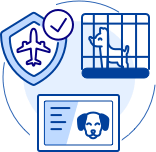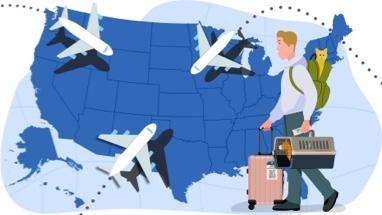Pet Passports - European Union

European Union (EU) Pet passports are issued for dogs, cats and ferrets only. Please check the country requirements for all other pets, such as birds, ornamental aquatic animals, reptiles, rodents or rabbits.
What is an EU Pet Passport?
- An EU Pet Passport is a document issued by an official veterinarian in a EU Member State (country within the EU) or other designated country that contains official health information related to a specific pet.
- An EU Pet Passport cannot be obtained in the U.S.
- Pet Passports issued to residents of the United Kingdom (other than Northern Ireland) are no longer valid for entry into the EU.
- The purpose of the EU Pet Passport is to simplify travel between EU Member States, but the EU has also allowed it to be used for pets returning to the EU from other countries as long as it is a non-commercial movement (i.e., no more than 5 animals, the animals are not changing ownership or intended for resale, and the animals are moving within 5 days before or after the owner or designated person*).
- If this is a commercial movement (i.e., more than 5 pets, the pet is being transferred to a new owner or sold, and/or the pet is moving more than 5 days before or after the owner or designated person*), the pet cannot return to the EU with the EU Pet Passport. Instead, you will need to obtain an EU Health Certificate issued (completed and signed) by a USDA Accredited Veterinarian and endorsed (counter-signed and embossed/stamped) by APHIS before the pet leaves the U.S.
- Find your destination country in the menu at the bottom of this page to see the requirements and obtain the correct health certificate. You must follow the steps for Dogs, Cats, and Ferrets that do not have an EU Pet Passport.
Who can enter information in an EU Pet Passport?
- There are multiple sections of an EU Pet Passport. The EU Pet Passport identifies who can enter information into the various sections by type of veterinarian.
- An “Authorized Veterinarian” specifically refers to an EU veterinarian.
- A “Veterinarian” is any licensed veterinarian, including a U.S. veterinarian.
- It is important that a U.S. veterinarian does not enter information in any section designated Authorized Veterinarian, as this could lead to invalidation of the EU Pet Passport and/or the pet being denied entry into the EU.
If a pet has an EU Pet Passport, what documents are needed to return to the EU?
- If this is a commercial movement (i.e., more than 5 pets, the pet is being transferred to a new owner or sold, and/or the pet is moving more than 5 days before or after the owner or designated person*), the pet cannot return with the EU Pet Passport. Instead, you will need to obtain an EU Health Certificate issued (completed and signed) by a USDA Accredited Veterinarian and endorsed (counter-signed and embossed/stamped) by APHIS before the pet leaves the U.S. To view these requirements and obtain the correct health certificate. You will need to follow the steps for Dogs, Cats, and Ferrets that do not have an EU Pet Passport.
- If this is a non-commercial movement (i.e., no more than 5 pets, the pet is not being transferred to a new owner or sold, and the pet is moving within 5 days before or after the owner or designated person*) and the rabies vaccination recorded in the EU Pet Passport is still valid and was recorded by an EU veterinarian, the pet will only need the EU Pet Passport to travel back to the EU.
- If the rabies vaccination recorded in the EU Pet Passport has expired and the pet requires revaccination in the U.S. or was already revaccinated while in the U.S., you will need to obtain an EU Health Certificate issued (completed and signed) by a USDA Accredited Veterinarian and endorsed (counter-signed and stamped) before the pet leaves the U.S.
If the pet’s EU Pet Passport is still valid:
Does the pet require a clinical examination in the U.S. before returning to the EU?
Pets returning to the EU with a valid EU Pet Passport DO NOT need a clinical examination.
Does the pet require any treatments in the U.S. before returning to the EU?
- Cats and ferrets do not require any treatments in the U.S. before returning to the EU.
- Dogs traveling to the UK (England, Northern Ireland, Scotland, and Wales), Ireland, Malta, Finland, and Norway need to be treated for tapeworm (Echinococcus multilocularis) 24 – 120 hours (1 – 5 days) prior to entry into those Member States/countries. This can be recorded in the dog’s EU Pet Passport by a USDA Accredited Veterinarian.
- Learn more about tapeworm treatment requirements for the United Kingdom, Ireland, Malta, Finland, and Norway.
* Designated person: a family member, friend, or other person authorized by the owner to travel with the pet.
NOTE: Always check with the airlines to determine what additional requirements they may have for your pet to travel.
Countries Participating in the European Union
Austria
Belgium
Bulgaria
Croatia
Cyprus
Czech Republic
Denmark
Estonia
Finland
France
Germany
Greece
Hungary
Republic of Ireland
Italy
Latvia
Lithuania
Luxembourg
Malta
Netherlands
Northern Ireland*
Norway**
Poland
Portugal
Romania
Slovakia
Slovenia
Spain
Sweden
Switzerland**
* Northern Ireland is part of the United Kingdom (UK), but will continue to follow European Union (EU) requirements even though the UK is no longer part of the EU.
** Norway and Switzerland are not part of the EU but have adopted EU legislation for import of most species of live animals.
Need Help?
Still Have Questions?
USDA-Accredited Veterinarians
Contact a USDA-accredited veterinarian for questions about your destination country's entry requirements for pets (including any needed vaccinations, tests, or treatments) and for issuance of health certificates.
Find a USDA-Accredited Veterinarian
USDA Endorsement Offices
Contact your nearest APHIS Veterinary Export Trade Services Endorsement Office for questions about endorsing a health certificate for pets.
For VEHCS help see the VEHCS help page. Routine APHIS VEHCS processing services are staffed Monday through Friday from 7:00 AM to 4:30 PM Central Time (CT) excluding federal holidays, the time listed in VEHCS reflects GMT.
Looking for Another Country?
Find your destination country requirements by using the dropdown menu below. If your country is not listed in the menu, visit Pet Travel: Unknown Requirements.
Find Your Destination Country Requirements
If your country is not listed in the menu, visit Pet Travel: Unknown Requirements.




